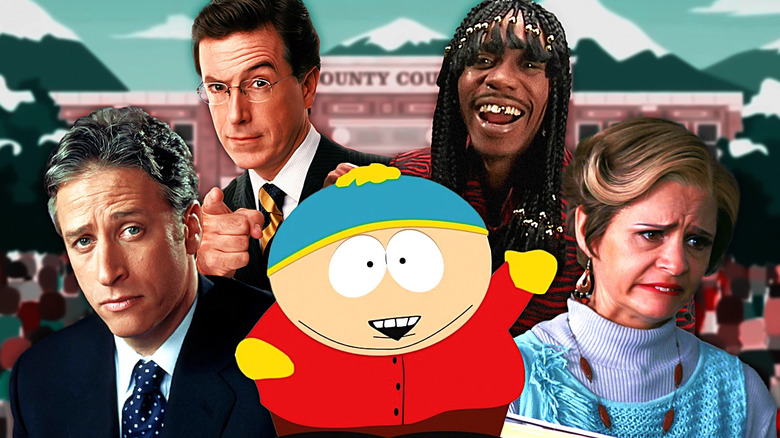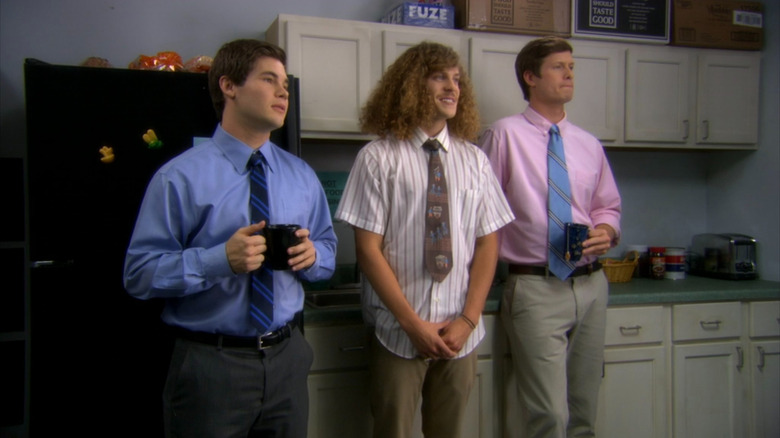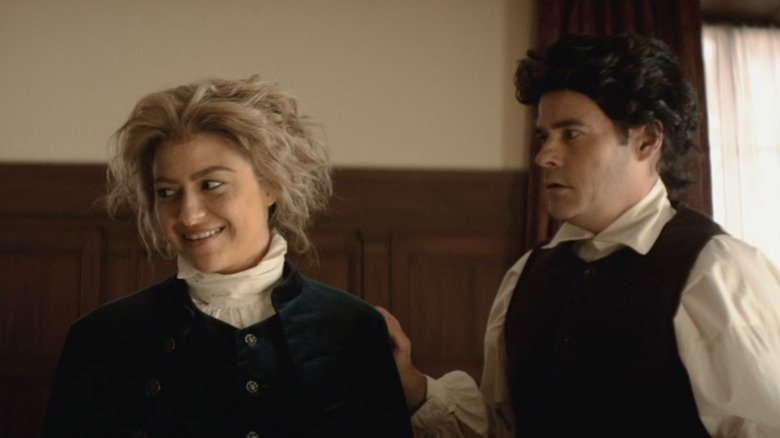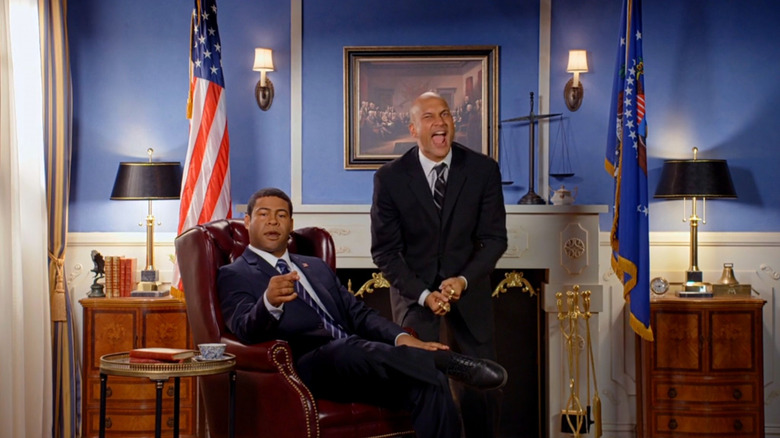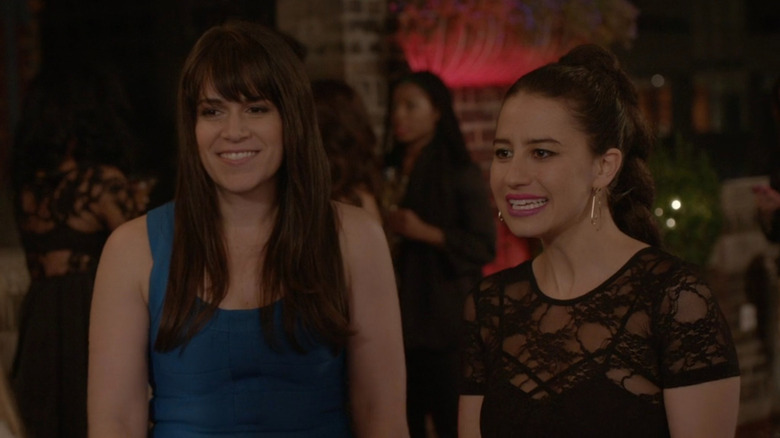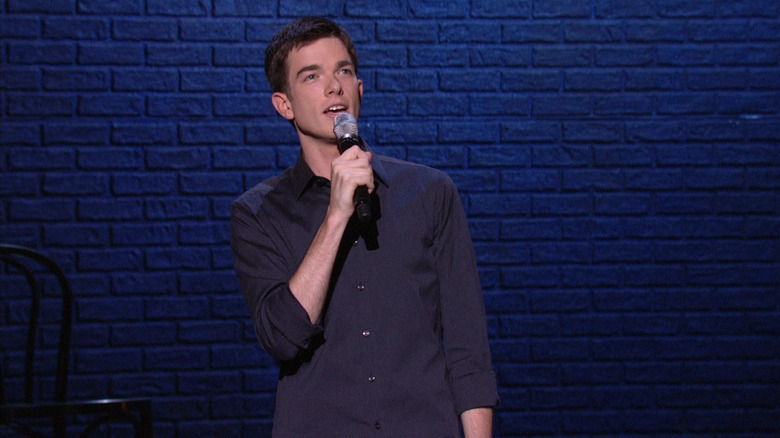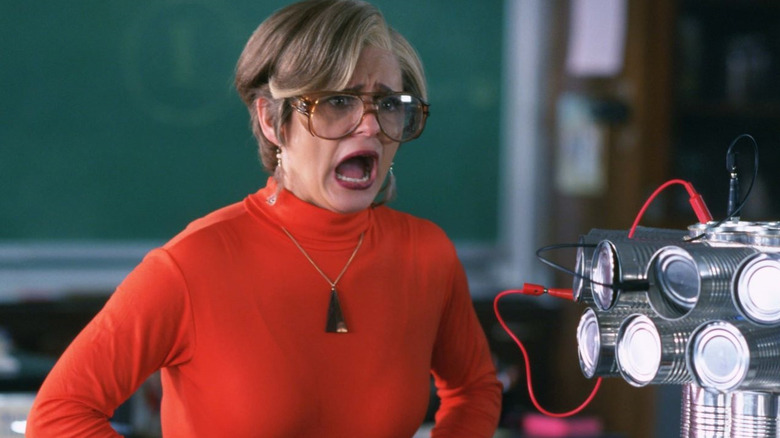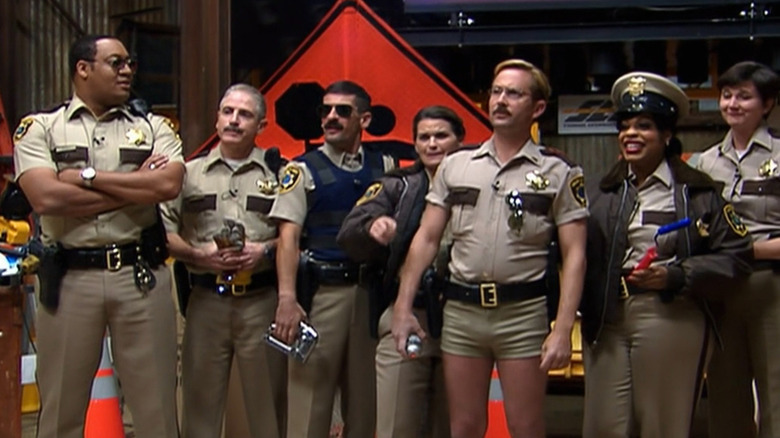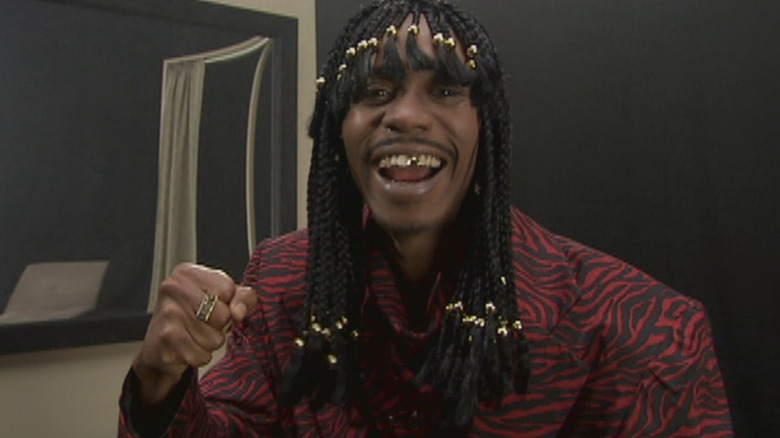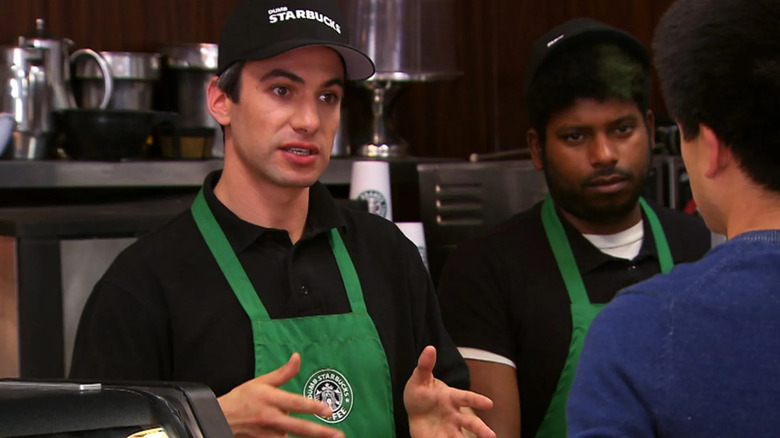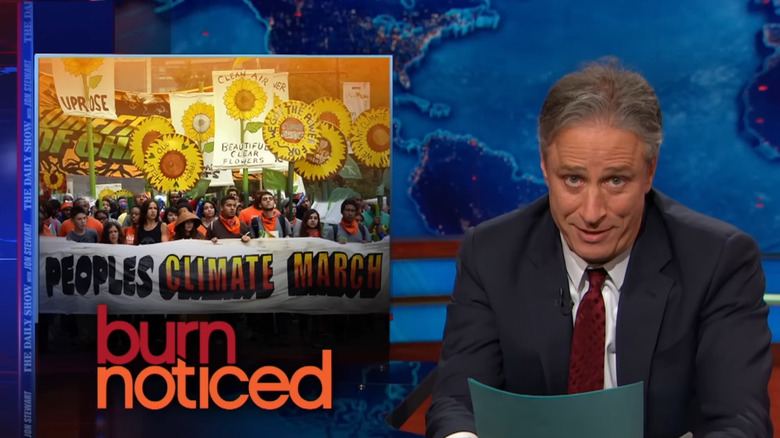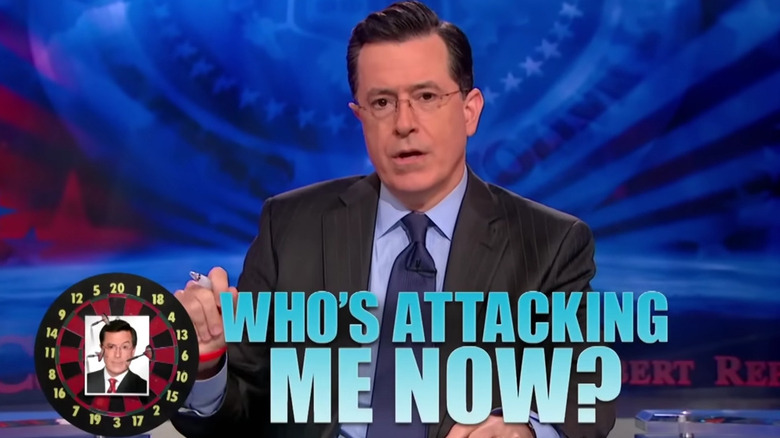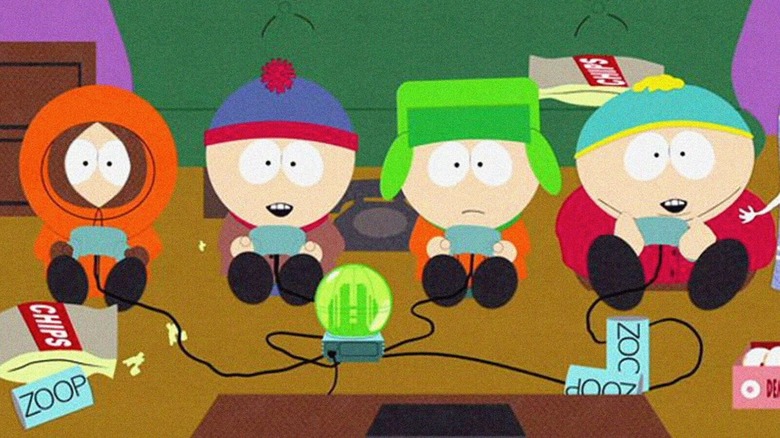The 12 Best Comedy Central Shows, Ranked
The early days of cable were glorious. TV sets didn't go dark for hours at a time. Instead, people had 24-access to whatever entertainment they wanted, and this led to a proliferation of specialty channels that focused on one thing. Enter The Comedy Channel and Ha!, which focused mostly on sitcom reruns and old movies. These two channels would later merge into a single entity, Comedy Central, with a greater emphasis on original programming.
It didn't take long for the Comedy Central to find its footing and release a sizable selection of animated series, sketch comedy shows, and stand-up specials. The channel soon became the place to visit to see what emerging comedic talent was ready to break into the mainstream. Considering that comedy is subjective, it may be difficult to rank the best Comedy Central shows of all time. What's hilarious to one person can be grating to another. Regardless, most people with a healthy funny bone should agree these are the series that helped make Comedy Central what it is.
Here are the best Comedy Central shows of all time.
12. Workaholics
Many folks will tell you HBO's "Girls" is the definitive millennial show, exemplifying what it meant to be a young person entering adulthood in the early 2010s. With all due respect, no other series touches on the genuine absurdity of being an adult in that era quite like "Workaholics."
The series follows three slackers — Adam (Adam DeVine), Anders (Andres Holm), and Blake (Blake Anderson) — working a do-nothing office job while still trying to party hard. "Workaholics" is a perfect showcase of arrested development outside, well, "Arrested Development," which is also a very funny show. But "Workaholics" really honed in on the awkward transition from college to the workforce, leading to hilarious situations like the guys dropping acid on a business trip and needing to pretend to be normal.
What really made "Workaholics" click was the chemistry between the three leads. Their conversations were heavily improvised, so their reactions and quips feel off-the-cuff. The show didn't overstay its welcome at just seven seasons, but we're still pretty bitter Paramount+ cancelled a proposed "Workaholics" movie. We'd love to see if those three ever grew up even though we're pretty confident that's impossible.
11. Drunk History
"Drunk History" feels like a show that could only exist on Comedy Central (even though they ended up canceling it after an initial season 7 renewal). It's a non-traditional premise where host Derek Waters speaks with comedians to recount some odd tale from history, all while the storytelling is inebriated. Their drunken ramblings then get reenacted by actors in pretty amazing period-accurate costumes, who also mouth along to the story, slurring and all.
The comedians were fun enough, but it was also a blast to see what guest stars they could get to portray the historical figures. Alia Shawkat portrays Alexander Hamilton during a special episode where Lin-Manuel Miranda drunkenly talks about the founding father who didn't throw away his shot. Some other notable portrayals over the years included Bob Odenkirk as Richard Nixon, Jack Black as Orson Welles, and Jesse Plemons as Edgar Allen Poe. The show's a ton of fun to watch, but you also get the sense that everyone involved is having a blast basically reenacting higher-budget middle school plays.
Not only was it hilarious, but you actually learned a little something about history. We intentionally use the word "little" because it wasn't always easy to make out what precisely was supposed to be happening if the guest host got a little too wasted.
10. Key & Peele
"Key & Peele" proved itself to be one of the best sketch comedy series of the 21st century with so many instant classics. From the "Substitute Teacher" sketch involving Keegan-Michael Key mispronouncing white students' names to Key and Jordan Peele playing overly enthusiastic valet drivers, the two had impeccable chemistry.
One of the hardest aspects of sketch comedy is finding the perfect way to end a bit. Monty Python famously didn't have buttons, as they transitioned from one scene to the next. But "Key & Peele" could find a great ending joke to cap off a series of other great jokes. As a testament to how well-received the series was at the time, Key reprised his role of Barack Obama's anger translator during an actual White House Correspondent's Dinner. Getting a thumbs-up from the president has to be a good way of ensuring one's place in the zeitgeist.
Jordan Peele has since retired from acting and gone on to become a horror film auteur director, but we really wish he'd still give sketch a chance now and then because he was just so good at it. "Key & Peele" was a sketch show for our times. It was absurd and wasn't afraid to offer social commentary without ever feeling preachy. It remembered that any good sketch needs to be funny, first and foremost.
9. Broad City
"Broad City" followed in the same vein as "Workaholics" but from the female perspective. You have two women coming of age in New York and getting messy along the way. There are ample relatable moments, such as feeling like a baller because you got an unexpected check for $8,000. But the thing that helped set "Broad City" from other shows of its type was that you could really feel the characters, particularly Abbi (Abbi Jacobson), wanting to grow up but feeling like there are obstacles every step of the way.
Another aspect that made "Broad City" special was how it centered female friendships above all else. Far too many shows depict women in competition with one another, but Abbi and Ilana (Ilana Glazer) celebrate one another's victories. When they do fight, they resolve it amicably and go back to being their own cheerleaders. Not only that, but the show was incredibly sex positive, specifically when it came to centering female pleasure, and it showed them enjoying drugs recreationally without it being seen as such a big deal (unless a drug trip was integral to the episode's plot). In a comedy landscape where it's far too easy to get cynical, "Broad City" was a breath of fresh, hopeful air.
8. Comedy Central Presents
"Comedy Central Presents" wasn't just a great show, it was an incubator for up-and-coming comedic talent. The show ran from 1998 to 2011, and during that time, it featured many stand-up comics performing quick 30-minute sets. You never knew who was going to take the mic next, because the show largely pulled from comics who weren't that well known at the time outside of maybe some bit parts on other Comedy Central series. It presented an opportunity to give new comedians a shot, and in the event Comedy Central gave them an hour-long special later, you already knew you were in for a treat.
Gabriel Iglesias sells out stadiums these days, but back in 2003, he was just hoping for his big break. Comics like Daniel Tosh and Demetri Martin cut their teeth on the stand-up circuit before getting their own Comedy Central shows years down the road. John Mulaney (above), Bo Burnham, and Iliza Shlesinger all had moments to show what they were capable of before becoming big names. It's a shame there's not really a show like "Comedy Central Presents" any longer (though it did get retooled as "Comedy Central Stand-Up Presents" for eight seasons from 2012 to 2019), because it truly was integral in fostering new talent in the entertainment ecosystem.
7. Strangers With Candy
"Strangers With Candy" emerged in 1999 as Comedy Central's first live-action narrative TV show. and they swung for the fences with this one. The series follows a 46-year-old former drug addict (Amy Sedaris) who goes back to high school for a second lease on life. The series was largely formatted around the tone of afterschool specials where teenagers would learn important lessons, except in "Strangers With Candy," they usually take away the wrong morals.
"Strangers With Candy" ran for three seasons, and honestly, it's kind of a miracle it got that far. It's such an odd, bizarrely delightful show that probably wouldn't get made in the first place these days. It's since become a cult classic with fans old and new alike loving Amy Sedaris' take on Jerri Blank, whose facial expressions are enough to sell jokes alone. It's a perfect demonstration of how the best Comedy Central shows are those where the creators are just trying to make themselves laugh rather than figuring out what could appeal to the most demographics.
6. Reno 911!
"Reno 911!" is one of those shows that could've run indefinitely if it wanted to. And in a way, it kind of did. While the main series has gone off the air, the show has popped back up over the years with movie specials and a renewed run on Quibi. Remember Quibi? The "Reno 911!" reboot is probably the most memorable thing the short-lived streaming service did, and it wasn't even their original project to begin with.
"Reno 911!" utilizes a mockumentary format in the style of "Cops." Only this time, it's following a bunch of incompetent law enforcement agents (played by many members of "The State" comedy group and more) out of Reno, Nevada who regularly encounter wacky citizens breaking the law. Thanks to the heavy use of improv, "Reno 911!" managed a naturalistic vibe to where the actors could react freely to any of the zany situations they found themselves in while on the beat. The great thing about this show is that while there were storylines, each scene often works on its own as a funny sketch, so you could tune in at any moment and enjoy the hijinks.
5. Chappelle's Show
Due to his anti-transgender sentiments, Dave Chappelle spends most of his time these days sparking justifiable outrage. It makes one long for the days where he had the sharpest and funniest sketch comedy show on television in the early 2000s with "Chappelle's Show." Comedy Central tried to find a replacement when Chappelle left the series behind with the likes of "Mind of Mencia" and "The Jeff Dunham Show," but "Chappelle's Show" took some of the biggest risks in comedy during its era and was difficult to replicate.
The very first episode has a sketch about how the leader of a white supremacist movement is a blind Black man. The show told you immediately what its ethos was, and from there, the show created a litany of catchphrases teenagers would yell at one another, like "I'm Rick James, b****!"
Chappelle himself left the series due to concerns that his intent with the comedy wasn't coming across. He was worried he was promoting racial stereotypes rather than dissecting them. How many sketch comedy shows throughout history warrant such a level of introspection? For what it's worth, it does seem clear where Chappelle stands on such issues through his sketches, but leaving a show after only a couple years lends to its overall legacy.
4. Nathan for You
How do you narrow down the best "Nathan for You" episodes? Each one is filled with such cringeworthy delights that you just have to see what Nathan Fielder gets up to next. He'll lead a drunk into a shop to break and then pay for stuff and then open a Dumb Starbucks, making national headlines in the process. Fielder, who went to one of Canada's top business schools, goes to small business owners to present a wacky idea of how to make more money. Throwing reason out the window, the owners agree and allow Fielder to wreak havoc wherever he goes.
It's hilarious to see the lengths people will go to, because if Fielder's followed around by a camera crew, that must mean he knows what he's doing, right? It's all aided by Fielder's socially awkward persona, and the series gets downright dramatic whenever he seeks to find connection, whether it's romantic or just making a new friend. More than perhaps any other TV host, Fielder understands what dynamic would make for the best TV episode. He's wacky when he needs to get someone stuffy out of their shell, but if someone he's interviewing goes off on a bizarre tangent, he's more than happy to let them fly further off the handle.
"Nathan for You" is peak television and set the stage for an even more ambitious Fielder project, "The Rehearsal" (now with two seasons at the time of this writing). It's Nathan Fielder's world, and we're all just living and laughing in it.
3. The Daily Show
"The Daily Show" is one of Comedy Central's longest-running series, but it took a while to figure out what this kind of show could do. It first materialized in 1996 with Craig Kilborn as the host, and while it was a parody of news shows, there was an inconsequential feeling to the proceedings. It felt more like a riff on local news, but that changed once Jon Stewart took the helm. From that point forward, the show took a more global perspective, satirizing current events. There were still jokes, but you also had Stewart himself offering a perspective that was hard to come by on regular news programs.
During the 2008 presidential election, "The Daily Show with Jon Stewart" became many people's go-to news source. Many at the time considered it just as credible as the regular news, and that can be somewhat terrifying to think about, even if they did offer a sobering yet satirical perspective on the week's headlines. At least people were staying informed on current events from somewhere. Eventually, Stewart left, and Trevor Noah took the reins even, though we're still adamant Roy Wood Jr. should've been the host at some point.
Stewart has since returned to temporarily fill in for hosting duties every now and then, but "The Daily Show" has given rise to so many other satirical news sources. "Last Week Tonight with John Oliver" and "Full Frontal with Samantha Bee" owe a debt of gratitude to "The Daily Show" for more reasons than just those shows' hosts getting their start on Comedy Central. "The Daily Show" set the template for how to be both hilarious and informative.
2. The Colbert Report
We previously discussed how "The Daily Show with Jon Stewart" spawned numerous other jokey news shows. However, the show's greatest gift to pop culture is its sister program that went even further in skewering both politics and the media: "The Colbert Report."
Stephen Colbert, who got his start on both "Strangers With Candy" and "The Daily Show" on Comedy Central, created a satirical persona who was more akin to a Fox News show host than Stewart. During the show's run, he would praise then-president George W. Bush and bash any Democrats who got in his way. Of course, this was all in jest. By adopting the rhetoric used by the likes of Glenn Beck, Tucker Carlson, and Bill O'Reilly, Colbert pointed out the very hypocrisy at the heart of such hosts. At times, it seemed like Colbert was more interested in promoting himself as a brand than reporting on the news, and if that isn't the most pitch-perfect commentary on where the media is today, I don't know what is.
In a lot of ways, we probably need "The Colbert Report" today more than ever as the lines between facts and falsities become increasingly blurred. Sure, you can still find him on "The Late Show with Stephen Colbert," but it just doesn't feel the same. We want the Colbert that's willing to speak truth to power rather than be another cog in the late night media machine.
1. South Park
Deciding the best Comedy Central shows isn't easy. Everyone has a different comedic sensibility. Some people love high-brow witticisms while others enjoy a football to the groin. You may have watched some of the shows on this list and ignored others, but no matter who you are or what types of jokes you like, it's impossible to ignore "South Park." It's been a Comedy Central institution for decades now, evolving with the times. In fact, "South Park" makes for a pretty great cultural Rorschach test, as a group of people can watch the same episode and come away with entirely different perspectives as to who the show is making fun of.
"South Park" has incited controversy since its inception, yet when looking back at the older episodes, it almost feels quaint. Yeah, there are little kids calling each other horrible names, but the show would evolve into genuinely pushing the boundaries of good taste. Eventually, the show would begin incorporating social commentary into almost every episode, aided by the fact that each episode was written and animated in a single week so that it could comment on things that happened just a few days prior. The fact "South Park" has released multiple episodes about presidential elections the day after the election happened is nothing short of astonishing.
Any TV show that's on the air for over 20 years is going to have some low points, and there's no denying "South Park" has its share of them. Yet, it's the show that's become most affiliated with Comedy Central. Love it or hate it, there's no refuting the show's impact.
